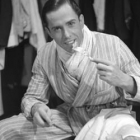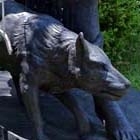Nick,was one of the stars of "Broadway Melody of 1936" - a TCM classic. His co-stars were Robert Stack, Buddy Epsen and Eleanor Powell. Why did his career go down the tubes?

Chapter XXXVI
December 1918 - How My Daughters Were Helped to Escape from Russia - Their Adventurous Flight
Three times a week - twice a week for the meetings with my husband - I made my way out to the hospital of the Island of GolodaL Very ill already, I made superhuman efforts to carry to my dear prisoner the two heavy baskets with his food and his linen. Every time I felt my strength failing me a little more. The cold was intense that year, and I was obliged to cover myself up warmly, which made my task all the more difficult. But what was worse was when the electric tramways were not working by reason of the current being interrupted or owing to strikes. Then I had to carry my burden the whole way on foot from the Millionaia to the Island of Golodai, and it took me nearly two hours. One day, when I had got to Vassoli-Ostrov, being unable to go on, and my hands being frozen, I stopped and leant up against a house to take breath. Suddenly I saw-a rare thing ~ a fiacre! I stopped it and asked the driver what he would want to drive me on.
"Two hundred roubles," he said.
At that time it meant a hundred and fifty francs. I was nearly half-way, nevertheless I took the fiacre, feeling incapable of walking a step further that day.
Another time when I was carrying my baskets a good country-woman who was driving one of those low carts used for carrying wood and who was going my way, called out to me :
"He, Barinia, take a seat on my cart, You look so tired, my poor soul! " I accepted with joy, and behold me seated upon the logs, with my back to the horse, my feet almost touching the ground!
On the morning of December 4th/17th, Peter Dournovo came to see me. Energetic, resolute, alert, with an excellent heart, he took me aside and said to me:
"Princess, I have come to propose something to you. You will have to make your decision at once. One of our friends, one of those young officers who risk their lives every day in order to come to the help of others, has arrived from Finland this morning and goes back again this afternoon at four. This is Captain Serge Serguievitch de HerscheIman. He is dressed like a Red Guard, and all precautions for to-day have been taken. Will you trnst your daughters to him? He undertakes to enable them to pass the Finnish frontier. The cold has much diminished, we have a full moon, so the conditions are excellent."
"But where are they to go? " I asked. "I know no one in Finland. I can't let them go off like that into the unknown."
"Everything has been considered and planned out by me," said Peter. "They will go first to Terijoky, where our people will take them to the Sanatorium of Rauha, which is near the cataract of Imatra, There there is a charming woman, Nadejdo Alexandrovna Kharina. who has been several months there with my sister. The proprietor of the sanatorium is Dr. Gabrilovitch, an excellent doctor, a good and friendly man, with his wife and daughter living with him. Once they are there, you can have your mind at rest about your little daughters. Your laundress will go with them, and at the risk of shocking her modesty I have had prepared for the two young princesses passports in the name of Petroff, as the laundress's daughters! Reflect," he went on, "that you should have your hands free" now in order to occupy yourself with nothing except the Grand Duke and his liberation; all the forces of your mind, all your energy should be expe'nded in this one direction. Such an opportunity will not present itself soon again. I myself am marked down by the Bolshevists, and have to move every night to a new place. I have had to change my name and passport twice already. See what I look like in the street!"
And taking out a big pair of spectacles from his pocket, together with a little beard which he fixed on in a twinkling, he became unrecognisable at once.
"Obviously this kind of game is too dangerous, and one of these days I shall be obliged to cross the frontier with my faithful acolyte, Lieutenant Michael Wielandt of the Horse Grenadiers; I beg of you, therefore decide! "
I called the two girls and Marianne, and, after some very natural moments of hesitation and tears, it was decided that at three o'clock Marianne should take her little sisters and the laundress first to the Cathedral of Our Lady of Kazan, in order to ask for God's blessing on the expedition, then to a flat iin X- street, where the captain should come to fetch them. The girls took a bag apiece, which they carried with difficnlty, and I parted from them with great grief and terrible anxiety in regard to their dangerous adventure. I followed them all the time in my thoughts, and did not breathe freely again until, four days later, Captain Herschelman brought me back a letter from Irene announcing that they had arrived safely, and that Mme. Kharina was an angel of goodness, and giving a detailed description of the journey.
After taking a moving farewell of "Sister Marianne " and receiving the false passports, they squeezed into a tram with the laundress and their new guide. This tram took them to the Ochta station, where they started about six o'clock, arriving at ten in the evening at a little station named Waskelevo. There they had to get into a cattle-truck, in which thev found some Finnish peasants who were going back to get milk to sell next day in Petrograd at high prices. These women sang such doleful songs that Irene and Nathalie, whose minds were full of their father in prison and of their brother and of their mother, at a loss for everything, even of food, began to weep.
After half an hour's travelling, the train stopped and it was necessary to jump out with the bags into rather deep snow. Following a pathway, they reached a small house (an isba), where, after a conversation in low tones between their guide and a young boy, they were given three small sledges. The night was superb; a fairy-like moon lit up the great firs which bent under the weight of the snow. The sledges moved in single file. In the first sat an Euglish lady and a Swede; in the second Irene and Captain de Herschelman ; and in the last Nathalie and the laundress. They arrived at three o'clock in the morning at another little isolated house, where the captain called for fresh horses, The man of the isba refused, saying that the snow was melting and that he could not drive them, but that they had only two versts (2 versts = I.5 miles) to go on foot, and he would guide them. At the end of the two versts the unfortunate children had walked fifteen! Their strength was going gradually, the melting snow clung to their high boots of felt and to their clothes. The captain and the guide carried their bags, but, in spite of that, every quarter of an hour they fell from exhaustion and drank the snow thirstily! They begged the captain to leave them there to die, as they had not strength to go on. The idea, however, that if they were caught it might do harm to their father in prison made them strive again to move on. They came presently to a rivulet, the ice on which was cracking owing to the thaw. How were they to get across without falling in? The Swede, hardened by sport, lay down and made a bridge out of his body, which he kept stiff, and the women walked over on their improvised bridge. A flickering light in the distance gave them hope that they were nearly at the end of their arduous journey. When they had entered this first Finnish house, feeling wretched and worn out from fatigue, they slept on a wooden bench. A sleep of two hours gave them back their strength. They got into sledges again, and only in the evening after thirty-two hours of travelling did they reach Terijoki, the Finnish frontier. On arriving there the captain went to the local Commandatur, where a friendly Commissary gave permission for them to continue their journey to Viborg and Ranha without putting them in quarantine. At Ranha the comfort of the sanatorium, the welcome given them by the good doctor and his family and the affectionate solicitude of Madame Kharina, combined to console them altogether and to give them courage to await with patience the early arrival of their parents.
I have been able to describe this extraordinary jonrney of my daughters, thanks to a diary which one of them kept at this period; I have scarcely altered anything in the text.





